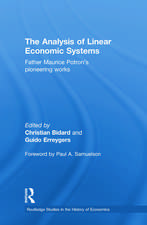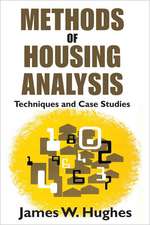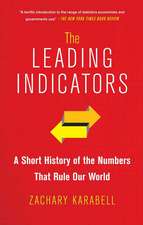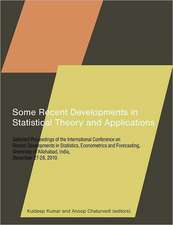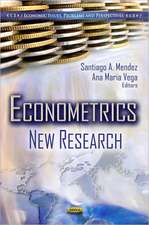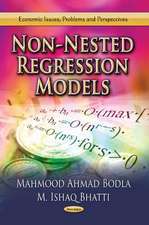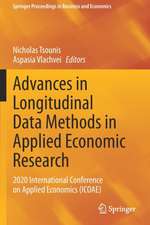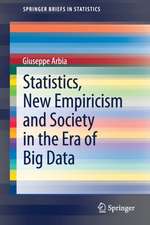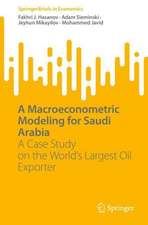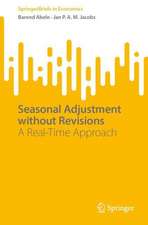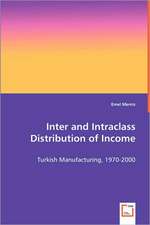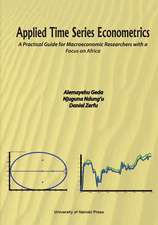The Kalman Filter in Finance: Advanced Studies in Theoretical and Applied Econometrics, cartea 32
Autor C. Wellsen Limba Engleză Hardback – 30 noi 1995
Since both the programs and the data used in the book are available for downloading, the book is especially valuable for students and other researchers interested in learning the art of modeling with time varying coefficients.
| Toate formatele și edițiile | Preț | Express |
|---|---|---|
| Paperback (1) | 635.31 lei 6-8 săpt. | |
| SPRINGER NETHERLANDS – 5 dec 2010 | 635.31 lei 6-8 săpt. | |
| Hardback (1) | 642.18 lei 6-8 săpt. | |
| SPRINGER NETHERLANDS – 30 noi 1995 | 642.18 lei 6-8 săpt. |
Din seria Advanced Studies in Theoretical and Applied Econometrics
- 20%
 Preț: 568.83 lei
Preț: 568.83 lei - 20%
 Preț: 817.36 lei
Preț: 817.36 lei - 18%
 Preț: 809.56 lei
Preț: 809.56 lei - 24%
 Preț: 793.67 lei
Preț: 793.67 lei - 15%
 Preț: 640.06 lei
Preț: 640.06 lei -
 Preț: 383.12 lei
Preț: 383.12 lei - 18%
 Preț: 1222.62 lei
Preț: 1222.62 lei - 18%
 Preț: 950.33 lei
Preț: 950.33 lei - 18%
 Preț: 950.03 lei
Preț: 950.03 lei - 15%
 Preț: 637.41 lei
Preț: 637.41 lei - 15%
 Preț: 645.79 lei
Preț: 645.79 lei -
 Preț: 387.38 lei
Preț: 387.38 lei - 18%
 Preț: 945.30 lei
Preț: 945.30 lei - 18%
 Preț: 949.73 lei
Preț: 949.73 lei -
 Preț: 386.22 lei
Preț: 386.22 lei - 18%
 Preț: 949.73 lei
Preț: 949.73 lei - 18%
 Preț: 952.40 lei
Preț: 952.40 lei - 18%
 Preț: 945.47 lei
Preț: 945.47 lei - 18%
 Preț: 954.45 lei
Preț: 954.45 lei - 18%
 Preț: 947.35 lei
Preț: 947.35 lei - 15%
 Preț: 645.60 lei
Preț: 645.60 lei - 18%
 Preț: 975.43 lei
Preț: 975.43 lei - 18%
 Preț: 1226.24 lei
Preț: 1226.24 lei -
 Preț: 392.60 lei
Preț: 392.60 lei - 15%
 Preț: 632.22 lei
Preț: 632.22 lei -
 Preț: 382.36 lei
Preț: 382.36 lei
Preț: 642.18 lei
Preț vechi: 755.51 lei
-15% Nou
Puncte Express: 963
Preț estimativ în valută:
122.89€ • 131.40$ • 102.46£
122.89€ • 131.40$ • 102.46£
Carte tipărită la comandă
Livrare economică 17 aprilie-01 mai
Preluare comenzi: 021 569.72.76
Specificații
ISBN-13: 9780792337713
ISBN-10: 0792337719
Pagini: 172
Ilustrații: XVI, 172 p.
Dimensiuni: 156 x 234 x 21 mm
Greutate: 0.47 kg
Ediția:1996
Editura: SPRINGER NETHERLANDS
Colecția Springer
Seria Advanced Studies in Theoretical and Applied Econometrics
Locul publicării:Dordrecht, Netherlands
ISBN-10: 0792337719
Pagini: 172
Ilustrații: XVI, 172 p.
Dimensiuni: 156 x 234 x 21 mm
Greutate: 0.47 kg
Ediția:1996
Editura: SPRINGER NETHERLANDS
Colecția Springer
Seria Advanced Studies in Theoretical and Applied Econometrics
Locul publicării:Dordrecht, Netherlands
Public țintă
ResearchCuprins
1 Introduction.- 2 Tests for parameter stability.- 3 Flexible Least Squares.- 4 The Kalman filter.- 5 Parameter estimation.- 6 The estimates, reconsidered.- 7 Modeling with the Kalman filter.- A Tables of References.- A.1 Stability tests by partitioning data.- A.2 Tests for heteroscedasticity.- A.3 Models in the literature.- B The programs and the data.- B.1 Subroutines.- B.2 The main programs.- B.3 The data.



